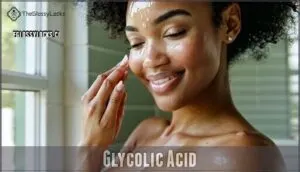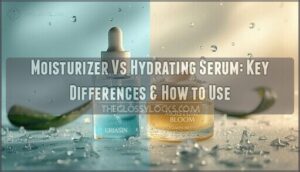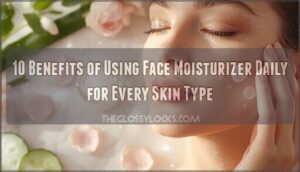This site is supported by our readers. We may earn a commission, at no cost to you, if you purchase through links.

For acne treatment safe during pregnancy, you can use gentle cleansers with glycolic acid or low-concentration benzoyl peroxide. Azelaic acid is also doctor-approved.
Avoid retinoids, high-dose salicylic acid, and isotretinoin (Accutane), which can harm your baby’s development.
Stick to a simple routine: wash twice daily with mild soap, moisturize with non-comedogenic products, and never pick at blemishes.
Remember, pregnancy skin changes are temporary—like midnight ice cream cravings. Smart diet choices and stress management techniques can also transform your skin’s appearance.
Table Of Contents
- Key Takeaways
- Causes of Pregnancy Acne
- Safe Acne Treatments
- Unsafe Acne Treatments
- Lifestyle Remedies
- Choosing Safe Treatments
- Frequently Asked Questions (FAQs)
- What acne treatment can I use while pregnant?
- Is 5% benzoyl peroxide safe during pregnancy?
- When will pregnancy acne clear up postpartum?
- How does pregnancy acne differ from regular acne?
- Can pregnancy acne predict babys gender?
- Do natural remedies effectively treat pregnancy acne?
- Is makeup safe during pregnancy acne flares?
- Conclusion
Key Takeaways
- You can safely use gentle cleansers with glycolic acid, low-concentration benzoyl peroxide (5%), or azelaic acid during pregnancy, as these are doctor-approved for treating acne.
- You should avoid retinoids, isotretinoin (Accutane), tetracyclines, and high-concentration salicylic acid, as these treatments can harm your baby’s development.
- You’ll benefit from a simple skincare routine—washing twice daily with mild soap, using non-comedogenic moisturizers, avoiding over-cleansing, and keeping hair products away from your face.
- You should always consult your doctor before using any acne treatment during pregnancy, even over-the-counter products, to ensure it’s safe for both you and your baby.
Causes of Pregnancy Acne
When you’re pregnant, hormonal changes can cause your oil glands to go into overdrive, leading to breakouts.
If you’ve had acne before or notice flare-ups around your period, you’re more likely to experience pregnancy acne.
Hormonal Changes
Hormonal changes are the main reason for acne during pregnancy, especially in the first trimester.
Androgen increases ramp up oil production, creating the perfect storm for breakouts.
Estrogen influence may help some, but it’s unpredictable, and hormone fluctuations trigger pesky spots that can stick around until postpartum acne fades.
Stick to pregnancy skincare with safe products to keep it manageable.
Increased Oil Production
Surprise, your glands are working overtime! Hormonal influence ramps up oil (sebum) secretion during pregnancy, fueling acne breakouts.
This glandular activity, while keeping skin hydrated, often clogs pores instead.
Want a tip? Stick to pregnancy-safe skincare, like gentle cleansers, to manage sebum. A balanced diet can help too.
Safe acne treatment methods are key to staying clear!
Risk Factors
Your acne history and hormonal sensitivity play big roles in pregnancy acne.
The first trimester’s unpredictable nature means anyone can be affected, though severity impacts vary.
If you’ve had acne linked to menstrual cycles, your risk increases.
Increased androgens can trigger excess sebum production, contributing to breakouts.
While pregnancy risks like acne may feel overwhelming, the good news is most cases resolve after childbirth, protecting fetal safety.
Severity Variations
Your pregnancy acne severity can range from mild to severe, often shifting with hormonal influence.
Some face persistent acne throughout, while others see improvement after the first trimester.
Skin condition and treatment impact vary widely, but safety is key—stick with pregnancy acne treatment options approved by your doctor.
Remember, acne complications are temporary, and brighter, clearer days lie ahead!
Safe Acne Treatments
You can safely manage pregnancy acne with treatments like benzoyl peroxide, glycolic acid, and low-concentration salicylic acid. These options are effective, low-risk, and recommended by experts when used as directed.
Benzoyl Peroxide
Benzoyl peroxide is a reliable pregnancy acne treatment that works by reducing bacteria and excess oil.
It’s a safe acne treatment when limited to 5% concentration levels, minimizing side effects like mild dryness.
Stick to small areas during application, and always check product formulations for safety.
Consider product options carefully before use.
For peace of mind, consult your doctor before starting any pregnancy-safe acne products.
Glycolic Acid
Glycolic acid is a pregnancy-safe acne treatment when used in low concentrations, typically under 10%.
It gently exfoliates, brightens skin, and helps reduce pregnancy acne.
Stick to pregnancysafe skincare, avoiding stronger peels to prevent skin sensitivity.
For the best results, check product labels, use sunscreen daily, and consult your doctor about pregnancy-safe acne products for long-term effects.
To avoid irritation, consider lower peel concentrations.
Low-Concentration Salicylic Acid
Moving from glycolic acid, consider low-concentration salicylic acid (up to 2%) for pregnancy-safe acne treatment.
This OTC option exfoliates gently, reducing breakouts.
To stay safe:
- Do a patch test to check for irritation.
- Use sparingly on problem areas.
- Limit application frequency to once daily.
- Watch for potential irritation on sensitive skin.
Pregnancy skincare can be simple and safe!
Unsafe Acne Treatments
Not all acne treatments are safe during pregnancy, and some can harm your baby.
Avoid options like isotretinoin, tetracyclines, and high-concentration salicylic acid, as these are known to pose serious risks.
High-Concentration Salicylic Acid
High-concentration salicylic acid isn’t your skin’s best friend during pregnancy.
While it’s great for tackling breakouts, research, including animal studies, links its oral counterpart, oral salicylates, to potential birth defect risks.
Stick to pregnancy-safe acne products, like low-dose options, and always check product labels.
For acne treatment while pregnant, safe alternatives can help you avoid unnecessary risks while keeping skin clear.
Tetracyclines
Tetracyclines aren’t pregnancy-safe due to risks like fetal bone growth issues and tooth discoloration.
These oral antibiotics should be discontinued by week 15. Why? They can impact fetal health and raise birth defect concerns.
Instead, consider these alternatives:
- Penicillins or cephalosporins
- Low-risk topical antibiotics
- Doctor-approved pregnancy-safe options
Always consult your provider for antibiotic advice.
Isotretinoin
Isotretinoin is a no-go during pregnancy—it’s linked to severe birth defects and even fetal loss due to its teratogenicity.
Its contraindications are crystal clear, requiring strict protocols like mandatory contraception and pregnancy tests.
While it’s incredibly effective for acne, safe acne medications such as benzoyl peroxide and azelaic acid are better choices.
Always prioritize safety over risks.
Lifestyle Remedies
You can manage pregnancy acne with simple changes to your daily habits. A gentle skincare routine, clean pillowcases, and stress reduction can make a big difference.
Gentle Skincare Routine
Pregnancy-safe skincare starts with a gentle routine. Use a cleanser with mild ingredients and lukewarm water to avoid irritation. Pat dry with a non-abrasive cloth and apply a moisturizer to lock in hydration.
Avoid harsh scrubbing—your skin’s already doing overtime! Pregnancy-safe acne products can help tame pregnancy acne while keeping your routine safe and effective.
Plant extracts offer benefits that can improve skin health.
- Choose mild cleanser ingredients
- Pat skin dry—don’t rub
- Stick to a gentle, consistent routine
- Apply moisturizer after washing
Avoiding Over-Cleansing
Over-cleansing might leave your skin begging for mercy. Stick to gentle cleansers and wash twice daily with lukewarm water to protect your skin barrier.
Overwashing messes with oil glands, causing pregnancy acne to flare. Patting dry, not rubbing, is key! A pregnancy-safe skincare routine loves balance—clean but not stripped.
Consider using a gentle cleanser during pregnancy. Patting dry, not rubbing, is key! A pregnancy-safe skincare routine loves balance—clean but not stripped.
| Issue | Cause | Solution |
|---|---|---|
| Dry skin | Over-cleansing | Use gentle cleansers |
| Oiliness | Irritated oil glands | Wash twice daily |
| Redness | Barrier damage | Stick to lukewarm water |
| Breakouts | Unbalanced routine | Pat dry after washing |
Haircare Tips
Your hair and scalp deserve attention in the fight against pregnancy acne.
Give your hair some love—keeping it clean and off your face can make a world of difference for clearer skin.
Keep oily hair away from your face by washing it regularly with gentle shampoos that don’t contain irritating ingredients. Pull hair back during sleep and exercise to prevent transferring oils to your skin.
Check product ingredients carefully, choosing pregnancy-safe beauty products specifically formulated for scalp health without triggering breakouts on your facial skin. Consider using a pregnancy safe shampoo to avoid harmful chemicals and ensure scalp health.
Reducing Stress
While managing your hair routine helps, don’t overlook how stress impacts pregnancy acne.
Your body responds to stress with hormone surges that can trigger breakouts.
Try mindfulness exercises or gentle yoga to calm your mind.
Prioritize sleep hygiene and maintain a healthy diet rich in anti-inflammatory foods.
Lean on social support when feeling overwhelmed, and remember, pregnancy-safe skincare routines work better when you’re relaxed – your skin reflects what’s happening inside.
Choosing Safe Treatments
You’ll need to check with your doctor before using any acne product during pregnancy, as many common ingredients can harm your baby’s development.
When selecting treatments, stick to pregnancy-safe options like benzoyl peroxide, azelaic acid, and low-concentration glycolic acid that effectively target breakouts without crossing the placental barrier, using ingredients that are gentle and effective.
Consulting a Doctor
While lifestyle changes help manage skin problems, your doctor should be your first stop before trying any treatments.
They’ll guide you toward pregnancy-safe options that work for you. Azelaic acid is a safe choice for pregnant individuals.
- Ask your doctor about ACOG recommendations for pregnancy acne
- Discuss your treatment options before starting anything new
- Consider a dermatology referral for specialized care
- Report any skin reactions to medication right away
- Schedule follow-up visits for monitoring progress
Avoiding Harmful Ingredients
After consulting your doctor about acne treatments, you’ll need to become an ingredient detective for pregnancy-safe skincare.
Always check product labels for harmful substances that could affect your baby.
| Avoid These Ingredients | Try These Alternatives Instead |
|---|---|
| Retinoids (tretinoin, adapalene) | Azelaic acid |
| High-concentration salicylic acid | Low-concentration (2%) salicylic acid |
| Isotretinoin | Benzoyl peroxide |
| Tetracycline antibiotics | Safe antibiotics (erythromycin) |
| Hidden dangers (vitamin A derivatives) | Glycolic acid |
Remember, OTC risks exist even in common products, as ingredient absorption varies by formulation, and it’s crucial to be aware of pregnancy-safe options.
Considering Alternative Therapies
When considering alternative therapies for pregnancy acne, peptides offer a safer option than retinoids by stimulating collagen production.
Light and laser therapies, including narrowband-ultraviolet B phototherapy, show promise without teratogenic effects.
While some complementary approaches like probiotics impact skin health, evidence remains limited for herbal remedies and acupuncture safety during pregnancy.
Dietary changes may help, but always discuss pregnancy-safe skincare options with your doctor before trying natural acne treatments.
Frequently Asked Questions (FAQs)
What acne treatment can I use while pregnant?
Safe options for pregnancy acne include benzoyl peroxide, azelaic acid, and low-concentration salicylic acid.
You’ll want to avoid retinoids completely.
Always check with your doctor before trying any treatment, even over-the-counter products.
Is 5% benzoyl peroxide safe during pregnancy?
Yes, 5% benzoyl peroxide is considered safe during pregnancy.
Your body absorbs very little of it through the skin, and multiple medical organizations recommend it as a low-risk option for treating pregnancy acne.
When will pregnancy acne clear up postpartum?
Your pregnancy acne will typically clear up within a few weeks to 3 months after delivery as your hormone levels return to normal.
You’ll notice gradual improvement with each passing week postpartum.
How does pregnancy acne differ from regular acne?
Your pregnancy acne packs more punch than regular breakouts due to heightened hormone levels.
You’ll notice it’s often more widespread, persistent, and may appear in new areas where you’ve never had acne before.
Can pregnancy acne predict babys gender?
Despite what old wives’ tales suggest, scientific research firmly refutes any connection between pregnancy acne and your baby’s gender.
Your hormonal fluctuations cause acne regardless of whether you’re carrying a boy or girl.
Do natural remedies effectively treat pregnancy acne?
While some natural remedies like tea tree oil and aloe vera may provide mild relief for your pregnancy acne, they aren’t consistently effective.
You’ll see better results combining gentle natural options with doctor-approved treatments, which can help enhance the effectiveness of these remedies for pregnancy acne.
Is makeup safe during pregnancy acne flares?
Like choosing shoes that won’t pinch your toes, you can wear non-comedogenic makeup during pregnancy acne flares. Look for oil-free, fragrance-free products and always remove makeup before bed.
Conclusion
Remember, finding acne treatment safe during pregnancy isn’t rocket science.
Your skin will eventually return to normal, but in the meantime, stick with doctor-approved options like glycolic acid, azelaic acid, or low-dose benzoyl peroxide.
Keep your routine simple, your diet balanced, and your stress levels in check.
When in doubt, always consult your healthcare provider—they’re your best resource for managing pregnancy skincare safely.
You’ve got this, mama!












